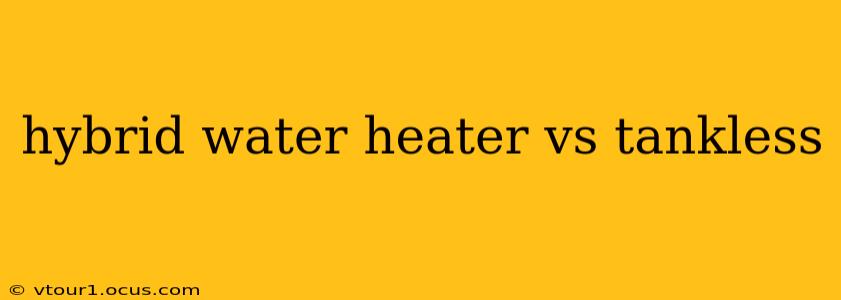Choosing the right water heater can feel overwhelming. Two popular options vying for your attention are hybrid (heat pump) water heaters and tankless water heaters. Both offer energy efficiency improvements over traditional tank water heaters, but they differ significantly in their operation and suitability for various homes and lifestyles. This comprehensive guide will break down the key differences to help you make an informed decision.
What is a Hybrid (Heat Pump) Water Heater?
Hybrid water heaters, also known as heat pump water heaters, extract heat from the surrounding air to warm the water in the tank. This makes them incredibly energy-efficient, often using up to 60% less energy than traditional electric water heaters. They still use a tank to store hot water, but the heating process is far more efficient. Think of it as a refrigerator in reverse; instead of removing heat, it’s transferring it.
What is a Tankless Water Heater?
Tankless water heaters, also known as on-demand water heaters, heat water directly as you need it, eliminating the need for a storage tank. This means no standby heat loss (a significant source of energy waste in traditional tank heaters), leading to considerable energy savings, especially in homes with lower hot water demands. However, they generally have a higher upfront cost.
Hybrid Water Heater vs. Tankless: Key Differences
| Feature | Hybrid (Heat Pump) Water Heater | Tankless Water Heater |
|---|---|---|
| Energy Source | Electricity (highly efficient) | Electricity or Gas |
| Water Storage | Large storage tank | No storage tank; heats water on demand |
| Upfront Cost | Moderate to High | High |
| Operating Cost | Very Low (due to high efficiency) | Moderate to High (depending on usage and fuel type) |
| Hot Water Supply | Consistent supply, but limited by tank capacity | Unlimited hot water supply (depending on unit size) |
| Space Requirements | Requires significant space for the tank | More compact, can be installed almost anywhere |
| Maintenance | Relatively low maintenance | Requires regular cleaning and descaling |
| Lifespan | Typically 10-15 years | Typically 20 years or more |
How Much Hot Water Do I Need? A Key Consideration
What size tank do I need for a hybrid water heater?
The size of the tank you need for a hybrid water heater depends on the number of people in your household and your hot water usage habits. Consider factors like the number of showers, laundry loads, and dishwashing cycles daily. Manufacturers provide sizing guidelines based on these factors.
Is a tankless water heater right for a large family?
Tankless water heaters can handle a large family, but the unit needs to be appropriately sized to meet the demand. Undersized units may struggle to supply enough hot water during peak usage periods. You may need a larger, more expensive unit to ensure sufficient hot water supply for a large family.
Which is More Energy Efficient: Hybrid or Tankless?
Both are more energy-efficient than traditional tank water heaters. Hybrids generally boast superior energy efficiency due to their heat pump technology, particularly in moderate climates. However, tankless water heaters shine in homes with low hot water demand, as they only heat water when needed. The best option depends on your individual circumstances and hot water usage patterns.
Which is Better for My Climate?
Hybrid heat pump water heaters perform best in moderate climates. Their efficiency relies on extracting heat from the surrounding air, so extremely cold climates can hinder their performance. Tankless water heaters are less affected by climate, although extremely cold temperatures can reduce their efficiency if they're gas-powered and require more energy to heat water.
How Much Does Each Type Cost?
Both hybrid and tankless water heaters have higher upfront costs than standard tank water heaters. Tankless water heaters typically have the highest initial cost, followed by hybrid models. However, the long-term operating costs of both are often lower, eventually offsetting the higher initial investment through energy savings.
What About Maintenance and Lifespan?
Both require some maintenance. Hybrids need periodic filter changes, while tankless models require regular descaling to prevent mineral buildup. Tankless water heaters generally have a longer lifespan (20+ years) compared to hybrids (10-15 years).
Conclusion: Making the Right Choice
The best choice between a hybrid and tankless water heater depends on your specific needs, budget, and climate. Consider your household size, hot water usage patterns, energy costs, and upfront vs. long-term cost considerations. Carefully weigh the pros and cons outlined above to determine which type of water heater is the most suitable and cost-effective solution for your home. Consulting a qualified plumber can provide valuable personalized advice.
